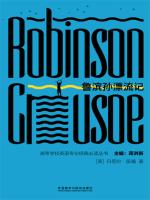Robinson Crusoe
Robinson Crusoe, this book must have occupied a place in everyone's childhood. As one of Daniel Defoe's representative works, this book is loved by many readers, especially children, for its realistic and natural writing, the interesting background of desert island survival and the determined and brave protagonist. Many middle schools and families will take this book as one of the children's enlightenment books to educate children to learn the excellent spiritual quality of Robinson. When I was a child, I used to love reading, always alone or with friends in the small street bookstore to read one after another picture books and books. Among them, Robinson Crusoe is one of the earliest books I contacted. The hero's wonderful experience on a desert island, touching exploration and adventure are of great appeal to young boys. When I read, I often fantasize that I am also like Robinson, experiencing the thrilling adventure in the story.
But just as the saying goes, "There are a thousand Hamlets in the eyes of a thousand people", the same story, at different times, will produce different understandings. This summer, I picked up the book again. Different from my childhood curiosity and desire, when I saw the familiar beginning, I actually had a wonderful feeling of meeting an old friend whom I had not seen for a long time.
Now, when I read a book, I must first get to know the author. Daniel Defoe, a writer who lived in England four centuries ago, also possessed the humanistic spirit brought by the cultural development at that time. Most of his characters are typical heroes, showing the wisdom and strength of human beings. In the 18th century, when the old and the new changed, the growth of the new European bourgeoisie and the emergence of a new trend in religion became the unique color of literature at that time, and Defoe's works were no exception. While reviewing Robinson Crusoe, I found that the hero's adventure story was in essence a reflection of the rising colonialism at that time: Robinson chose to go to sea regardless of his family property for the purpose of pursuing wealth, which corresponds to the Puritans' obsession with wealth; The early experience of opening up sugarcane fields is the history of colonists opening up plantations; The conflict with the natives and the encounter with "Friday" after being on a desert island are just like the colonialists who boast civilization and the so-called "backward" colonies. After the historical correspondence, the work has a completely different feeling.
With this new experience, I revisited Robinson's desert island life. Although his family is rich and he is loved by his parents, the protagonist Robinson is not a well-behaved rich boy. He longs for freedom, longs for the mysterious sea, and wants to achieve his own career, get a lot of wealth, and make a fortune. After that, he decided to go to sea without telling his parents, and traded with indigenous people in Africa, and succeeded in making his first bucket of gold. Then he went to sea several times with the ship, doing business in different places and accumulating wealth. In the fourth voyage, the ship that Robinson took was unfortunately wrecked on the reef, and only he survived and swam to an uninhabited island. In this desolate island, Robinson fully lived for 28 years, he learned to hunt game, breeding goats, through the cultivation of wheat to get bread, also built a wooden house as a "villa". In the 15 years of living alone, Robinson saw the remnants of indigenous cannibalism, quiet solitary life suddenly became dangerous. In the 24th year, he met and rescued Friday, who was a captive of the Aborigines, and took him as his friend and servant. Later, in contact with the Aborigines, he successively rescued Friday's father and a Spanish captain. In a rebellion of the British ship happened to dock in the island, Robinson finally got the chance to return to his native land, and finally after 35 years, ended the desert island life. At the end of the story, the island welcomed a group of new immigrants, was opened up, and Robinson also got the return of the Spanish captain and the wealth accumulated by early sailing trade, became a rich man, married happily and had children.
In fact, the whole story was adapted by Defoe according to the real desert-island events at that time, full of humanistic style and colonialism color. The first-person narrative technique and a lot of psychological description easily bring the reader into the perspective of the protagonist, which is quite artistic. When you taste the book from different angles, you can often get unexpected insights. While the story affirms colonialism, it is more spiritual than that. Robinson fought for survival on the island and got out of the predicament by his own hands. He was full of diligence, wisdom and creativity. His experience of conquering the island also shows the ambition of man to conquer nature; Peaceful and harmonious island life is full of freedom and harmony, in stark contrast to the hustle and bustle of human industrial civilization... These rich contents together constitute the diverse spiritual core of Robinson Crusoe, which also gives it a great and unique charm to attract readers of all ages.



 京公网安备 11010802032529号
京公网安备 11010802032529号